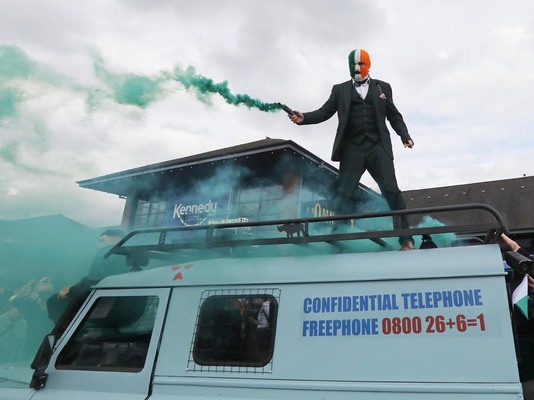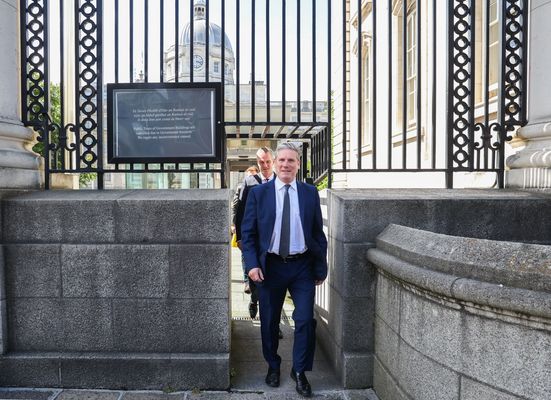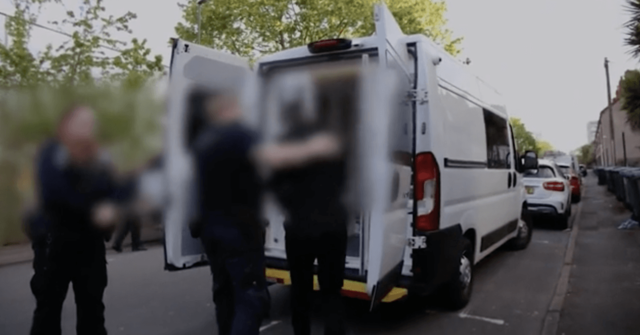IN these parts, the colour orange is associated with one thing and one thing only: the numerous parades of the Orange Order which take place mainly between April and August. The parades are so institutionalised that a five-month period of every year is widely referred to as “the marching season”, during which politics and everyday life are often paralysed or temporarily interrupted. This has been “normal” for decades, but allowing an exclusively Protestant private religious/political club the space to dominate the political calendar to this extent is anything but normal.
This year was the two hundredth anniversary of the banning of the Order by the British, a ban which lasted until 1845, though Orange marches were banned for much of the second half of the 19th Century. It was also the 25th anniversary of the banning of the Orange march from Drumcree church down the Garvaghy Road. It was this ban that became the political focus for a couple of weeks recently, as the old arguments were churned over yet again. Dear DUP MLAs, the planet is on fire in places, or drowning in others, and wars are raging so, no, Drumcree is not the number one priority. The only thing new this year was a discussion of the cost of PSNI overtime, given the Stormont funding crisis.
The Parades Commission has consistently upheld the Drumcree ban since it came into being as the regulator of parades from 1998. Last year the Commission recorded “Protestant/Unionist/Loyalist notifications” for 2,558 parades. There were 92 “Catholic/Republican/Nationalist notifications” and a further 935 notifications from “others”. The Commission placed conditions and/or restrictions on 154 parades/marches, of which 152 were P/U/L events. Only one arose from a C/R/N notification.
Of course, it is not just the marches that poison the atmosphere annually; it is the hate bonfires as well – literally. These bonfires emit as much CO2 equivalent in one night as 5,000 households in one year. And then there are the particles which do so much damage to health. Mercifully, these were lower this year due to rain in the early hours of the 12th which brought them down to earth.
Loyalists are killing & maiming themselves out of a perverse belief that higher & higher bonfires - a phenomenon not rooted in history - are central to their culture. This is the definition of stupidity, but few unionist politicians are prepared to say so.https://t.co/77cDsnWqZo
— Sam McBride (@SJAMcBride) July 16, 2023
Bonfires are a perfect illustration of the gains to be had from addressing the climate crisis: stop them and reduce CO2 emissions while improving air quality and hence health. Air pollution kills far more people than die by drugs and alcohol, by suicide or by road accidents, and much of it is caused by oil and gas central heating boilers, and vehicles burning petrol and diesel.
Some argue that the scale of emissions from other places and sources is so immense that we should not single out a “trivial” case such as bonfires, or even emissions from the island of Ireland. It is always tempting to argue that controlling methane emissions, say from Irish agriculture, will have little impact compared to the “methane bombs” coming from oil and gas fields mainly in the US, Russia and Turkmenistan. It would be cheap and easy to cap the latter emissions, which of course depends on the fossil fuel industry stepping up. It would make a huge difference if they did.
More than 1,000 human-caused "methane super-emitter events" were detected in 2022, with most of them coming from oil and gas fields. These super-emitting methane leaks could trigger dangerous climate tipping points.#ClimateChange #Methane #Sustainabilityhttps://t.co/L8vxDNSHCM
— Prospect Law (@ProspectUpdate) March 13, 2023
In an emergency everything counts and it is better to make demands on others from higher moral ground than from a position of doing nothing. Besides, addressing this crisis requires unprecedented international cooperation with everyone doing what they can. Instead, the fossil fuel firms are doubling down on shareholder dividends and continuing to invest in oil and gas exploration, which the British government among others is only too willing to license and subsidise. The Irish government is not far behind, spending as it does over €2 billion per year on direct and indirect fossil fuel subsidies.
I thought fossil fuel firms could change. I was wrong, writes #ChristianaFigueres
— Prof. Peter Strachan (@ProfStrachan) July 16, 2023
"Their unprecedented profits over the past year have shown their unwillingness to adapt. It’s now D-Day for them."#ClimateCrisis #RenewableEnergy #Oil #Gas #FossilFuels
https://t.co/u9tRTh9XJy
Which brings us to another orange cause. Why is it that the favourite colour of Just Stop Oil protestors is orange? Why do they slow-walk carrying orange banners? Why do they scatter orange dust and spray orange liquid over the Bank of England, MI5’s HQ and government department buildings?
🎃 BREAKING: LONDON PAINTED ORANGE 🎃
— Just Stop Oil (@JustStop_Oil) October 31, 2022
🧯 At 8:30am today, 6 Just Stop Oil supporters sprayed orange paint from fire extinguishers onto the Home Office, the MI5 building, the Bank of England and the headquarters of News Corp at London Bridge.
🎥 @cameraZoe pic.twitter.com/YCgTzvokQO
According to PhD student and Just Stop Oil activist Alex de Koning, orange is used because it is “a bright colour” and “a symbol of hope”, which only goes to show how context matters. As it happens, the influential right-wing think tank Policy Exchange agrees with him on this, at least as far as using orange as a thematic colour for their logo and publications. But that’s where agreement ends.
Policy Exchange (PE), like many of the nearby Tufton Street crew and the Tory party itself, not only receives oil industry funding but also promotes fossil fuel interests in a number of ways. As Peter Geoghegan of bylinetimes.com reveals, PM Rishi Sunak recently commended PE for helping to draft legislation designed to curb the tactics of Just Stop Oil and other climate activist groups, now described as a “crackdown” on “extremists”.
Rishi Sunak recently told an audience at Policy Exchange that the think tank inspired his government’s laws targeting climate change protesters – after it received funding from the US oil superpower ExxonMobil. https://t.co/3Vp4JEkbQU
— Jo Maugham (@JolyonMaugham) July 21, 2023
Sunak once worked for PE which has received substantial funding from US-based climate denial foundations. Perhaps this explains why Sunak is “uninterested in climate change”, in the words of Zak Goldsmith who resigned from the Westminster government at the end of June.
When Just Stop Oil heard about PE’s authorship of anti-protest legislation, they responded by giving Policy Exchange the orange paint treatment last week. Activists had already sprayed Tufton Street in October last year.
A government-appointed group of environment experts have launched a withering criticism of Rishi Sunak presiding over a “lackadaisical” approach to climate change
— Adam Vaughan (@adamvaughan_uk) July 20, 2023
"Friends of COP" group includes @emilyshuckburgh, @katehamptongray, Lord Stern & morehttps://t.co/n25VIchoe2
The genius guiding Britain through the climate crisis at the moment is Grant Shapps, SoS for Energy Security and Net Zero. Shapps has now written to the Labour party, which he refers to as “the political wing of Just Stop Oil” – you can see where this is going – asking them to pay for cleaning up the orange mess.
Just Stop Oil could have chosen green paint for the Policy Exchange make over. This would be appropriate because of PE’s role in engineering a last minute amendment to the Northern Ireland Troubles (Legacy and Reconciliation) Bill, otherwise known as the “bill of shame”. The latest shenanigans stem from Gerry Adams successfully persuading the Supreme Court in 2020 that he was wrongfully convicted for escaping from detention/internment all those years ago because his initial detention was unlawful – the Secretary of State had not considered the detention personally and had not signed the actual detention order.
@JustStop_Oil supporter, Peter, retired bouncer and Grandad from South London sprays paint on 55 Tufton Street, the office for various controversial neoliberal think tanks including the climate denialist Global Warming Policy Foundation, rebranded as @NetZeroWatch. #JustStopOil pic.twitter.com/7mSMPUW1IS
— Rich Felgate (@richfelgate) October 25, 2022
The implication of the Supreme Court’s ruling was that Gerry Adams and many others in the same position could now claim compensation for a miscarriage of justice and wrongful imprisonment. But the very idea of compensating people for being detained without charge or trial stuck in the throat of some, so within days, lobbyists at PE published a pamphlet arguing that “the Supreme Court’s judgment was clearly wrong” and that the law had to be changed. Lately, they came up with a few clauses to amend the 1972 legislation (Detention of Terrorists (Northern Ireland) Order) with retrospective effect, thereby closing down the possibility of compensation claims. These amendments to the Legacy Bill were taken up by the government and passed by the House of Lords on 5 July. The Bill is expected to become law in early September.
Facing up to the climate emergency is not easy politically or personally, but it is both urgent and unavoidable. There are well organised and funded lobby groups who constantly muddy the waters of popular debate and understanding as they do the bidding of the fossil fuel companies, and their tentacles spread across many policy areas. So beware. Climate justice needs to be urgently pursued and pursued on the basis of economic justice, within countries and between the north and south of the globe.







